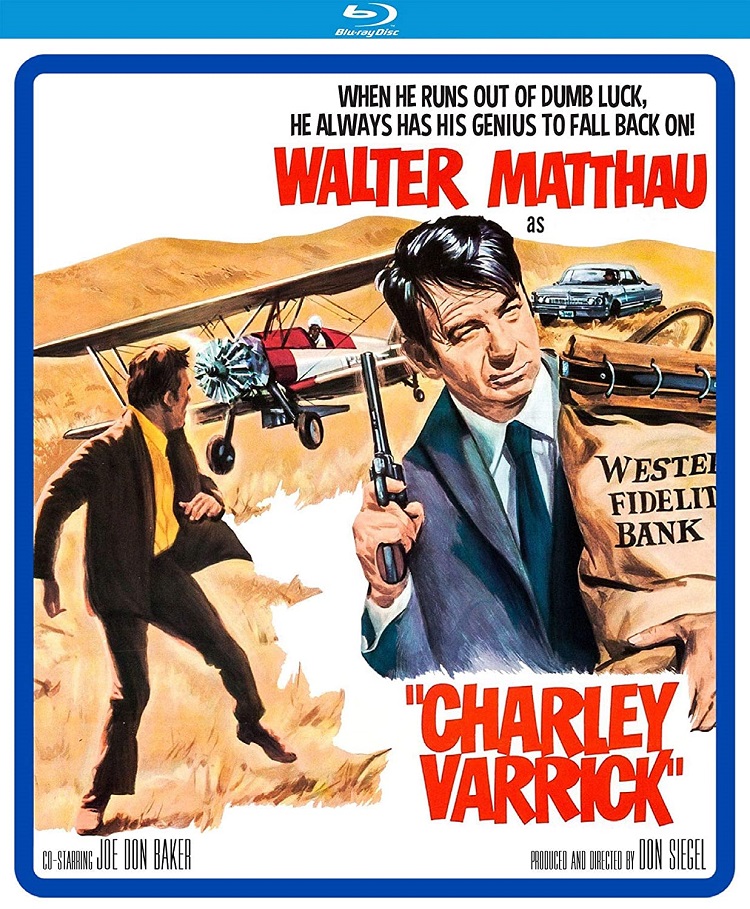
When I think of Walter Matthau, which is more often than you’d think, I think of him as a comic actor. My first memories of him are as a Grumpy Old Man, or as 1/2 of an Odd Couple. Certainly he was great in comedies and brought a light, hilarious touch to more serious films, but he was also a wonderful dramatic actor as well. He starred in numerous serious dramas like Fail Safe and JFK. He also starred in a number of action thrillers and spy movies like Charade, The Taking of Pelham One Two Three, Hopscotch, and the film we are here to review today, Charley Varrick.
What I love about Matthau is that there is underlying humanity and charm in all of his performances. Even when he’s playing the heavy or just a cantankerous old fart, there is always a spark behind those eyes, a shot of vitality, a warmth. So it is with Charley Varrick, Don Siegel’s 1973 thriller. In it, Matthau plays the titular Charley who used to be a trick pilot with his wife who turned to crop dusting when that got too dangerous. When the larger corporations made the job unprofitable, he turned to robbing banks – small country banks in which he plans to supplant his lifestyle, not get rich.
One such robbery goes bad, leaving a few police officers and two members of his crew (including his wife) dead. When Varrick and Harmann (Andrew Robinson) do escape, they find that their take is over $7 million which is good except there is no way a small-town bank would hold that kind of cash unless it was a holding place for the mafia, which is very, very bad.
The mob dispatches Molly (Joe Don Baker) to locate the money and kill anyone who stands in his way. Molly is an icy, detached, ruthless killer whose idiosyncrasies remind one of Chigurh from No Country For Old Men. (That’s not the only moment that seemingly inspired a modern filmmaker – at one point someone notes that he’s gonna go after Varrick with a “pair of pliers and a blowtorch” which shows up in Quintin Tarantino’s Pulp Fiction.) Molly pursues the money with ruthlessness, and Varrick feels the noose grow increasingly tight. Baker’s performance is as brutal as it is fascinating.
Matthau plays Charley Varrick like a man just doing his job. He’s a good guy who was in a tight spot and now finds himself in an impossible-to-win situation. He handles it all with a collected professionalism. Everybody handles everything with professionalism in this movie. Whether they are a bank teller, a crook, or a police chief, there is a job to do and its best to do is without too much emotion. Varrick allows himself a few moments to mourn his wife quietly (which Matthau plays brilliantly) but other than that it’s all about getting the job done and getting out alive.
Siegel’s direction is low key. There are violent outbursts and moments of subtle humor but mostly it’s a story being told without flash. The action is tightly packed and well done. It feels like a low-budget crime flick directed by an old master. Andrew Robinson gives the film kinetic energy. Varrick might be a regular guy who got into crime because he had to but Harmann is a career criminal and this is the biggest score he’s ever seen. He wants to blow the money right away on women, booze, and fancy digs, but Varrick warns him off. The cops and the mob will be watching, and spending lots of dough you didn’t have yesterday is a sure sign you did the job. Harmann doesn’t like it but he obeys. But there’s an underlying resentment and anger under that surface.
The plot doesn’t always make sense. Charley isn’t supposed to be a professional criminal, but a guy who turns to crime because he’s in a jam. Yet, he outwits both the law and the mob at every turn. He’s got connections to people your normal citizen wouldn’t have. Not that any of this matters much. The film moves at such a pace one doesn’t have time to consider who Charley Varrick is, but Matthau warm performance makes you root for him all the same.
Kino Lorber presents Charley Varrick with a new 4K master and an aspect ratio of 1.85:1 aspect ratio. Extras include an examination of Don Siegel’s signature style, a nice 72-minute making-of documentary, audio commentary by film historian Toby Roan, a booklet essay from Nick Pinkerton, and some trailers.